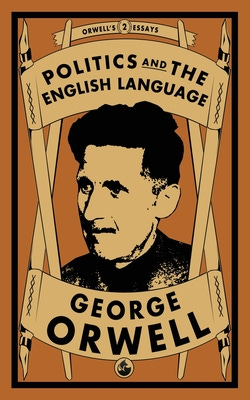In 1946, George Orwell published an essay entitled "Politics and the English Language." In his essay, Orwell criticized the political discourse of his time. He wanted language to be employed “as an instrument for expressing and not for concealing or preventing thought.”
Orwell identified five examples of bad writing. All of them shared two faults:
“The first is staleness of imagery; the other is lack of precision.”
“This mixture of vagueness and sheer incompetence is the most marked characteristic of modern English prose, and especially of any kind of political writing. As soon as certain topics are raised, the concrete melts into the abstract and no one seems able to think of turns of speech that are not hackneyed: prose consists less and less of words chosen for the sake of their meaning, and more and more of phrases tacked together like the sections of a prefabricated henhouse.”
Orwell didn’t just complain. He identified six rules of thumb for good writing:
1. Never use a metaphor, simile, or other figure of speech which you are used to
seeing in print.
2. Never use a long word where a short one will do.
3. If it is possible to cut a word out, always cut it out.
4. Never use the passive where you can use the active.
5. Never use a foreign phrase, a scientific word, or a jargon word if you can think of an everyday English equivalent.
6. Break any of these rules sooner than say anything outright barbarous.
Point number 3 reminds me of Mark Twain’s Rule 14 in Fenimore Cooper’s Literary Offenses: “Eschew surplusage.”
One sentence of Orwell’s caught my attention: “The defence (sic) of the English language…has nothing to do with correct grammar and syntax, which are of no importance so long as one makes one’s meaning clear, or with the avoidance of Americanisms…”
As one who writes Americanisms all the time, I am relieved that Orwell okays them. You can go a long way with a few Americanisms, as these guys prove:
On the other hand:
Orwell called the language he was protecting “English,” as if only Brits and a few others speak it. But two billion people now speak English, including 250 million in India alone.
Of course, the political language Orwell was complaining about reflected the politics of his era, which included Stalin’s fanatic Communism and Hitler’s evil Nazism and Britain’s turgid “socialism.”
According to Orwell, political English “is designed to make lies sound truthful and murder respectable, and to give an appearance of solidity to pure wind."
His characterization was true then and remains true today. Recall all the lies allegedly decent people have come up with for the Hamas October 7 atrocities against Jews and other Israelis.
But since Orwell’s time nearly 80 years ago, politics have changed, and not for the better. This is a good moment to update Orwell’s original analysis to accommodate some phenomena which are new or at least went unaddressed in his essay. Regardless, I do not believe he intended his short article to be exhaustive.
For example, Orwell did not mention the “performative” aspects of political language. I am using the word “performative” in its colloquial sense, that is, language used not to convey substantive information, but to signal one’s attitude.
Here’s an example:
Rep. Maxine Dexter: "We have to f*ck Trump" | Unseen News
Congresswoman Dexter is a fine example. We are seeing an epidemic of foul language from our Left which might make one long for the puffed-up Marxist lies and fascist rhetoric Orwell complained about, or for the intersectionalist and post-modernist academic jargon we have heard and read more recently.
These folks drop their naughty words all over the landscape, and they’re no better at it than Mr. Spock:
The giggling teenage schoolgirl Maxine Dexter represents her constituents in our House of Representatives, where she gets to speak—and worse, vote—on issues of war and peace. She can get people killed. Her foray into “F Bombs” demonstrates that she will do so with enthusiasm if higher-up Democrats tell her to, just the way she used that naughty word because someone told her to.
Hers was not what is commonly called “virtue signaling,” but something worse—obedience signaling.
Her F Bomb was an expression not of defiance but of submission, hardly distinct in its self-abnegation from the submission a dog demonstrates by peeing all over herself at the sight of her master.
This so-called “performativeness” is a phenomenon Orwell did not anticipate in his essay. Although the phenomenon no doubt existed in his time, it had not yet assumed the centrality to English language discourse it now occupies.
Here I’ll borrow a little from legal terminology: our courts define hearsay as an “out-of-court statement offered in court to prove the truth of the matter asserted.”
Dexter did not offer her “F Bomb” as true or false. It was not even a lie. If a witness were to offer to testify to Dexter’s statement, a court should not exclude it from evidence as hearsay.
We see this all the time: language used to convey not true or false information, but language as act, for example, language one uses to signify participation in the herd. Here’s another example:
“From the River to the Sea, Palestine will be free.”
It’s a commonplace that many of those who shout this slogan cannot identify the river or the sea or, for that matter, “Palestine,” whatever that is.
So what are they up to?
At the Versailles of Louis XIV, French aristocrats proved their credentials by clothing themselves the current fashions while they danced the current dances to the current tunes. Their participation in these ceremonies marked them as significant personages. Those who failed to keep up with the fashions fell out of favor.
Meanwhile, Louis the Sun King huddled in his palace with his few close advisors and made all the significant decisions himself.
A few centuries later, English aristocrats wore their credentials on their sleeves by eating their meals dressed in designated costumes. They accounted wearing a dinner jacket for lunch or a black tie instead of a white one as a transgression requiring expulsion from society.
Nowadays, students and graduates of our most expensive universities prove their credentials by parroting the correct terminology, even as it mutates from week to week, as “person of color” becomes BIPOC, “sexual preference” becomes “sexual orientation,” and “Indian” becomes “Native American,” which in turn becomes “Indigenous person.”
And so on.
For what? Several possibilities overlap.
One is that our leftists are trying to prove their authenticity. They avoid in public the academic jargon some use among themselves, which they now realize is a turn-off to normal people, although they have only the haziest idea why that is, except that the rest of us are too stupid to get it.
Fortunately, a United States Senator has volunteered to elucidate the mysteries:
They cast their F Bombs because we are too ignorant to grasp their complex ideas. They “dumb down” their language to our imagined level because they take it on faith that the rest of us are capable of no more than velar grunts, or at best, F-bombs.
Their naughty words are another manifestation of their identity politics. If they talk the way they imagine we talk, they also imagine we will confuse them for ourselves, after which we will vote for them, because we will think they are us.
The corollary: if only we shed our false consciousness and came to understand how right they are, we will fall in line. They need to change only the “messaging,” not the message.
But sometimes the messaging is the message. Someone who limits her vocabulary to childish naughtiness says nothing worth hearing.
Beyond authenticity, they seek to demonstrate their commitment. Their F Bombs show how intensely they care, not like those of us who use measured language, which we use only because we are emotionless and indifferent to human suffering.
They also intend their language as an expression of hostility. They’re mad as Hell and they’re not going to take this anymore. They must be enraged; their authenticity and commitment force their anger upon them.
In his article, Orwell did not deal with the phenomena I identify here. He was operating from the assumption that political language should concern itself with truth and falsity, with facts and lies, with logic and unreason.
Maybe to some extent that was how language operated in Orwell’s time and Anglosphere; it no longer is. Frustrated by their failures to convince and control, leftists more and more resort to cheap shortcuts, starting with obscenity and progressing inevitably to violence. We all see it coming.
Orwell did show a kind of self-awareness leftists do not find in themselves. He confessed, “Look back through this essay, and for certain you will find that I have again and again committed the very faults I am protesting against.”
To which I add, “Me, too.” Communication is an ongoing struggle. It requires constant vigilance directed at every word of every sentence of every paragraph.
But like any other form of truth-seeking, it is worth the effort.
Max Cossack is an author, attorney, composer, and software architect (he can code). His most recent novel is High Jingo. He lives with his wife in Arizona in a house beleaguered by these three feral cats:







One of the things that have most annoyed and depressed me over the last 40 years or so, and perhaps even more so today, has been the tacit acceptance by middle of the road and conservative citizens of language designed by the political and social Left to co-opt any resistance to their policies even before any honest discussion about them can take place. Examples are everywhere, but here are just a few: gender affirming care, “our democracy”, mostly peaceful protest, right wing or fascist (as applied to label those who want less government control over citizens, the near opposite of fascism) vs. left wing (amazingly, no one is ever identified as such), insurrection as applied to protests - out-of-control or not) that aren’t explicitly Leftist in nature, and on and on.
A performative expression - Whatever, Dude! - is one of my favorites. Even though 'whatever' alone can usually get the job done. I must say, it doesn't in anyway satisfy the recipient. Quite the opposite. The reply from them is generally more performative than my own. ;-)
This however, "The defence (sic) of the English language…has nothing to do with correct grammar and syntax, which are of no importance so long as one makes one's meaning clear, or with the avoidance of Americanisms…" made my day.
I got into a tiff with a commenter the other day when I wrote "Wahlah" and they (user name: pinoche...) criticized, as improper grammar, my writing such a thing by asking "what does that even mean?" They then answered their own question by saying the word is "voila." So I said "wahlah means voila." (I started to say that it was an Americanism but thought better, thinking I may be the only American who uses it. Hey, but who's counting, right.? ;-)) They would have none of that. They got kind of nasty with me at this point, so I said I don't think your complaint has so much to do with improper grammar as it does with improper or poor 'diction.' (Even though Wahlah isn't really a word, still) I was surprised when he let me have the last word by leaving me alone after that. To my credit, I never got nasty with him as he did with me. ;-)
Note the capitalization's of the direct copy and paste below: what am I missing here?, again:
Merriam Webster: Vwa-Lah, Wa-Lah, Wa-La: The Many Misspellings of Voilà. It is clear that the \v\ in the pronunciation of voilà is sometimes not heard, and this, combined with the mismatch between voilà’s spelling and pronunciation, has led to a number of misspellings of the word based on its pronunciation.
The Urban dictionary was not so kind: "Voila" for idiots.
"Voila" is French for "Look Here" but people who are clueless sometimes say or spell it "Wa-lah" because the French do not pronounce the "V" as clearly as English speakers would.
Anyway Max, I obviously enjoyed your article. I often wish I had taken a course or two in writing, but just as obviously never did. Thanx for another great article. BTW, you had me going down a rabbit hole with your Beatles links, and I bout never made it back here. ;-)